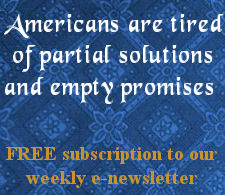
There is talk of a new American civil war. Indeed, the vitriol of opposing parties is reaching levels heretofore unseen. It is especially vicious now over the retirement of Justice Anthony Kennedy. There is nothing civil about this coming war. For now, it is still a culture battle, but it might be better labeled as an uncivil war.
This new uncivil war is different from America’s last fratricidal conflict. At least back then there were social units involved that united against other social units. Everything was defined leaving no room for doubt one way or the other. It was territorial. Whole states fought against other states. Families and communities united to back one party or the other.
A Distorted Vision of Liberty
In today’s uncivil war none of these factors exist. There are no social units or territorial claims. There are instead collections of individuals scattered all about. Perhaps more disconcerting is the fact that the two sides are fragmented and inseparably intermingled.
Civil wars are generally fought as a way to define the future course of events. What defines this uncivil war is a lack of definition or even a desire to define. It thrives on a great dissatisfaction at nothing specific, but rather everything in general.
However, at the center of this uncivil war is a distorted vision of liberty that was ironically articulated by the departing Justice Anthony Kennedy.
In his now infamous “mystery of life” passage of the 1992 Planned Parenthood of Southeastern Pennsylvania v. Casey decision, he declared that “At the heart of liberty is the right to define one’s own concept of existence, of meaning, of the universe, and of the mystery of human life.”
What Does Saint Thomas Say About Immigration?
A Great Divide: Two Americas
Of course, Kennedy’s definition of liberty alone did not change America. He merely codified the sixties’ ethos that said individuals should do-their-own-thing. He so-to-speak handed down a court decision that tries to turn John Lennon’s anarchical Imagine into settled law.
This anything-goes concept of liberty has shattered America. It is the great unsettled question that has haunted and mocked American politics ever since the sixties and is now turning everything uncivil.
America’s failure to embrace Kennedy’s definition of liberty in its fullness has led to clashing interpretations. It provoked a dramatic backlash around issues like abortion and homosexuality. Indeed, America is mired in a culture war that shows no signs of abating.
Competing Narratives
Political observers have ventured to define the sides in this civil culture war.
What does Saint Thomas Aquinas say about Marriage?
In his book, The Fractured Republic, Yuval Levin describes the clash of two conflicting narratives. The first is a nostalgic “fifties” America clinging to frenetic progress and a mirage of social unity, while the second is a similarly nostalgic “sixties” model chained to extreme individualism, sexual promiscuity and do-your-own-thing liberty.
This depiction of the modern crisis is helpful in describing many aspects of America’s Culture War and even the recent elections. On the surface, this fight looks like a conflict of violently opposite belief systems.
However, looking deeply, one can see both the fifties and sixties models are fruits of the same philosophy of classical liberalism that idealizes individual autonomy and maximum freedom. They both contain processes, which tend to weaken the social fiber. One model set in motion the other.
Thus they are merely two clashing phases of a single process that will eventually destroy things enough that it might then progress to more extreme and totalitarian versions of Kennedy’s “liberty.”
An Internal Crisis Hollowing Out Society
A more likely scenario of what ails America is a crisis inside liberalism itself. Many commentators are advancing this theory since social decay has reached a point that neither the fifties and sixties models can function properly in today’s postmodern chaos.
In his book, Why Liberalism Failed, Patrick Dineen writes of how “the achieving of complete and supreme freedom” has led to a personal autonomy that has separated individuals from “places, relationships, memberships and even identities.”
Liberalism’s radical agenda has hollowed out the unifying principles, intermediary institutions and above all the religious convictions that give meaning and purpose to life. It has atomized society and minimized the influence of leaders and true elites. The result is the present state of disillusionment and fragmentation.
The New York Times columnist David Brooks writes of people “without a moral vocabulary, with only scattered shards of values, with no firm foundations for when times get tough.”
[like url=https://www.facebook.com/ReturnToOrder.org]
Polish philosopher Ryszard Legutko laments liberal modernity’s anti-culture that has led to “a gradual sliding down from the high to the low, from the refined to the coarse,” which has brought vulgarity to language, behavior, education and moral rules.
As this crisis has intensified, so also has the vitriol. The vulgarity and coarseness are going ever lower. Without grace, manners, or mediating civil institutions or structures, the political debate is degenerating into a coming uncivil war that can easily turn violent.
Thus, everyone feels uncomfortable at this stage of the struggle. Those desiring a restoration of a secular American order feel the weakness of their shattered lives that no booming economy can restore. Those seeking the outer limits of their autonomy sense the emptiness of their self-identification, which no amount of wishful thinking can overcome. It is a recipe for disaster.
Real Focus of the Debate
Thus, the crisis inside liberalism is very grave—a fact that many social scientists have the honesty to admit. However, there are other factors that they have chosen to ignore.
If it were only a crisis inside liberalism, the situation would appear almost hopeless.
Fortunately, history rarely follows neat categories. While America has been presented as a land of liberalism, it has never been an entirely liberal nation. This liberal America is often portrayed as a land of modernity, immorality and frenzied lifestyles. And yet there has always been a significant number of Americans who have resisted the harsh aspects of this super-industrialized civilization.
Hope in a Different America
These Americans do not feel comfortable in this stressful, immoral and inorganic world. They yearn for calmer times with a more reflective pace of life. They even admire, with distant longings, the remnants of a Christian civilization they never knew.
These Americans have vague Christian notions of God, family and country for which they are willing to sacrifice. They acknowledge God’s blessings and grieve for the nation. They nurture a selfless love for America, especially in times of crisis. Indeed, liberals fear this kind of American much more than the fifties model that shares their philosophy.
The real uncivil war must involve these unarticulated Americans that will play an ever greater role in the nation’s future.
The focus of the debate cannot be the shattered America embracing variations of Kennedy’s liberty from which nothing can be expected. It must instead be oriented toward that Christian America from which all is possible.
[like url=https://www.facebook.com/ReturnToOrder.org]
As seen on CNSNews.



